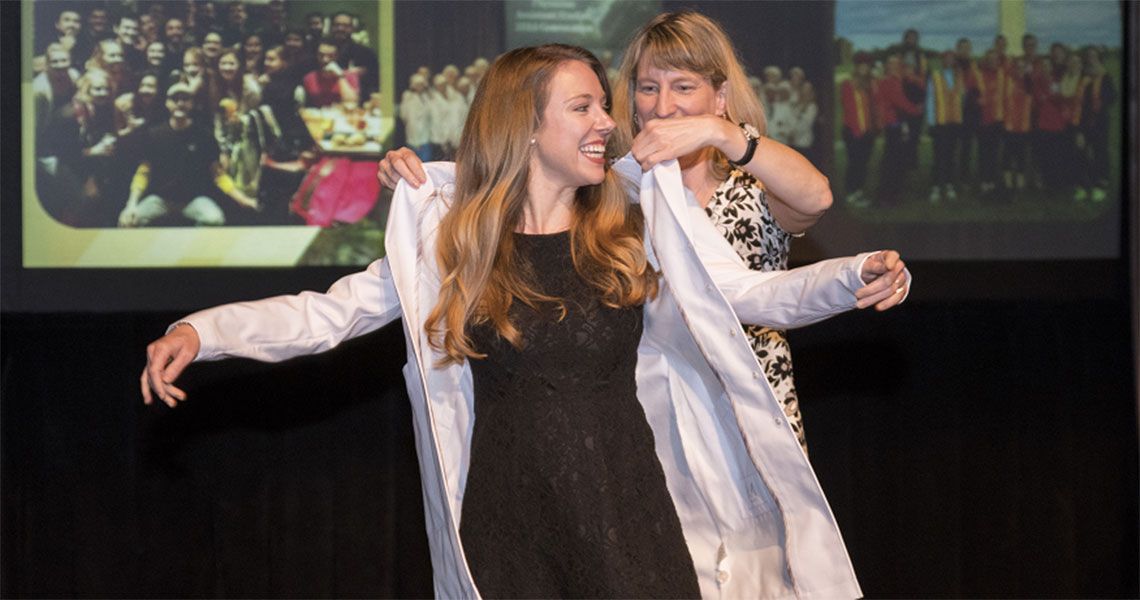The problem was the down jacket, recalled David Glasser, PA-C, adjunct instructor of physician assistant (PA) studies at the George Washington University School of Medicine and Health Sciences (SMHS). Glasser, who joined the New York City Fire Department as a paramedic before 9/11, had made the switch to PA and was working in the emergency department (ED) of a local hospital.
“Let me set the scene for you: it was a cold and snowy Saturday night in January,” Glasser said, during his keynote address at the SMHS Physician Assistant Program White Coat Ceremony, held during Commencement Week. “But this Saturday night was different – it was unusually quiet. Now we would never say the ‘Q’ word out loud, because we knew if someone did say the ‘Q’ word, all hell would break loose.”
A young surgical intern, known as “Intern Steve,” however, uttered the fateful word and jinxed the entire shift. Within minutes, a 22-year-old male with stab wounds to the chest was rushed into the ED. They alerted the surgical team – a “Plan Blue” – and after arriving in Operating Room Two, Glasser noticed that one of the patient’s arms was still inside his puffy down jacket. Intern Steve grabbed a pair of surgical scissors to slice through the sleeve and assess any wounds.
“I was a new PA at this time, but I knew not to cut the down jacket,” Glasser said. “I repeated my concerns to Intern Steve.”
Intern Steve, though, ignored him. “I want you to imagine what it would be like if 20 chickens exploded,” Glasser said, explaining that air in operating rooms is sucked out rather than pumped in. “It was snowing feathers in the operating room.”
The operating chief walked in, saw the plumage, and everyone pointed to Steve. “Should’ve listened to the PA,” Glasser said. “So, why am I telling you a story about a mistake that was made? Well, you’ll make mistakes during your career in medicine. ... Medicine is very humbling. That’s why we call it ‘practicing medicine.’ ”
For the PA students in the audience, Glasser’s talk – comforting advice from years spent in the field – was a fitting end for their classroom-based education and the beginning of their clinical careers. What’s key, he counseled, is listening to patients, parents, and providers, and relying on the foundation of knowledge they’ve built while at SMHS. Keeping up with medical advancements, such as personalized care and genomics, he added, is also critical, particularly with the ever-evolving world of evidence-based medicine.
“And lastly, and most importantly, do not cut the down jacket,” Glasser said.
The audience laughed, students clapped, and Glasser departed the stage, his words, like those of student speaker Christopher Vaudo, lingering over the graduating class of 2018.
“We need to be gentle with ourselves and realize we can positively impact those around us every day just by waking up, showing up, and shutting up and listening,” Vaudo said, adding that PA students are, by nature, driven, ambitious, and sometimes self-critical. “Today, we have taken a truly awesome responsibility on, so be awesome, be tenacious, be excellent, be loving with your coworkers, be tender with your patients, and be gentle with yourselves. The good that we do in our lifetimes will be utterly astounding.”
Vaudo, who got his start in health care before beginning PA school with stints at clinics in Alaska and Africa (where he learned Swahili and climbed Mount Kilimanjaro), was selected by the PA faculty as the recipient of the Physician Assistant Outstanding Student Award.
In completing the leap from student to professional, members of the PA Class of 2018 also traded in their short white coats for long ones, a ritual replete with symbolism. “When you think about this long white coat and the privilege and the symbolism that’s part of it, I want you to think about all those interactions you’re going to have with patients as a clinician,” said Lisa Alexander, EdD ’03, MPH ’89, PA-C ’79, professor of physician assistant studies at SMHS. “Think of the fibers in that coat and how each interaction could be represented by one of the fibers, and that over time, your identity as a PA is going to really be the representation of all the patients you’ve taken care of.”
The white coats, she added, are also part of a tradition of paying it forward; alumni of the PA program, including members of the PA Class of 2017 who were encouraged to participate through a match challenge proposed by classmate Sean Yu, PA ’17, donated the funds for the coats.
Following Alexander’s address, the Class of 2018, with help from faculty, crossed the stage of the Dorothy Betts Marvin Theatre and officially donned their white coats before reciting the Physician Assistant Oath. To a standing ovation, they filed out of the theater, leaving their days as pupils behind.



